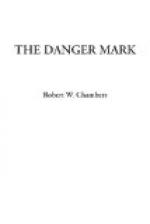A horrid sort of scream answered the shot; the boar lurched off among the rocks, and after him at top speed ran Duane and Miller, while Geraldine, on swift skis, sped eastward like the wind to block retreat to the mountain. She heard Duane’s rifle crack again, then again; heard a heavy rush in the thicket in front of her, lifted her rifle, fired, was hurled sideways on the rocks, and knew no more until she unclosed her bewildered eyes in her lover’s arms.
A sharp pain shot through her; she gasped, turned very white, and lay with wide eyes and parted lips staring at Duane.
Suddenly a penetrating aroma filled her lungs; with all her strength she pushed away the flask at her lips.
“No! No! Not that! I will not, Duane!”
“Dear,” he said unsteadily, “you are very badly hurt. We are trying to carry you back. You must let me give you this——”
“No,” she sobbed, “I will not! Duane—I—” Pain made her faint; her grasp on his arm tightened convulsively; with a supreme effort she struck the flask out of his hand and dropped back unconscious.
CHAPTER XXIII
SINE DIE
The message ran:
“My sister badly hurt
in an accident; concussion, intermittent
consciousness. We fear
spinal and internal injury. What train
can you catch?
SCOTT
SEAGRAVE.”
Which telegram to Josiah Bailey, M.D., started that eminent general practitioner toward Roya-Neh in company with young Dr. Goss, a surgeon whose brilliancy and skill did not interfere with his self-restraint when there were two ways of doing things.
They were to meet in an hour at the 5.07 train; but before Dr. Bailey set out for the rendezvous, and while his man was still packing his suit-case, the physician returned to his office, where a patient waited, head hanging, picking nervously at his fingers, his prominent, watery eyes fixed on vacancy.
The young man neither looked up nor stirred when the doctor entered and reseated himself, picking up a pencil and pad. He thought a moment, squinted through his glasses, and continued writing the prescription which the receipt of the telegram from Roya-Neh had interrupted.
When he had finished he glanced over the slip of paper, removed his gold-rimmed reading spectacles, folded them, balanced them thoughtfully in the palm of his large and healthy hand, considering the young fellow before him with grave, far-sighted eyes:
“Stuyvesant,” he said, “this prescription is not going to cure you. No medicine that I can give you is going to perform any such miracle unless you help yourself. Nothing on earth that man has invented, or is likely to invent, can cure your disease unless by God’s grace the patient pitches in and helps himself. Is that plain talk?”
Quest nodded and reached shakily for the prescription; but the doctor withheld it.




